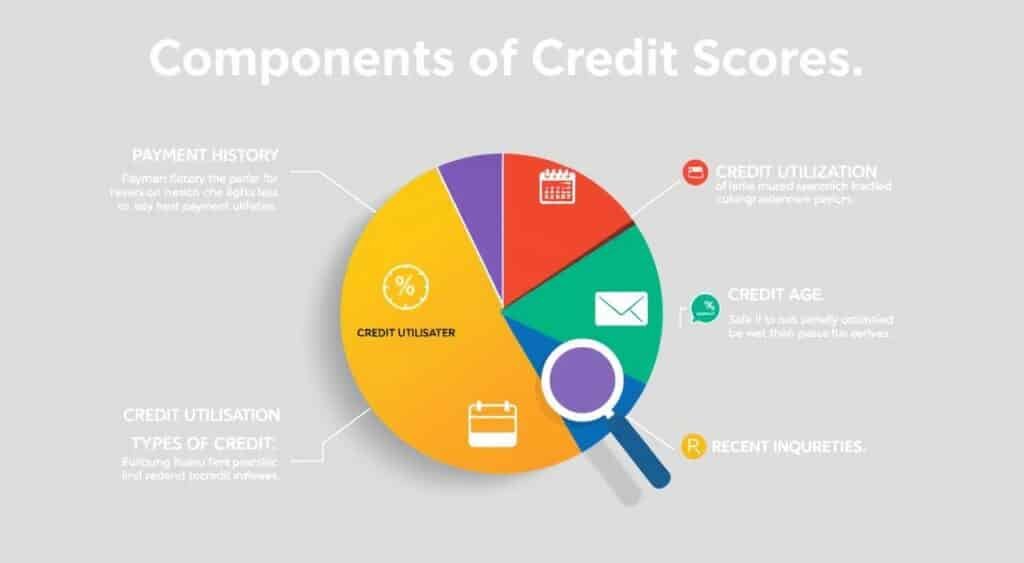What Are The Best Strategies For Credit Rebuilding?
Credit Rebuilding: your credit takes time and strategy. But, with the right steps, you can boost your score. Start by knowing your current credit score and making payments on time. Also, keep your credit use low and build good credit habits.
Check your credit reports for errors and fix them. Use tools like secured credit cards or credit-builder loans to help. These steps will help you rebuild your credit.
Key Takeaways
- Understand your current credit status and identify areas for improvement
- Establish a payment history by making timely payments on all your debts
- Manage your credit utilization ratio by keeping balances below 30% of your available credit
- Consider using a secured credit card or credit-builder loan to build credit
- Monitor your credit reports and scores regularly to track your progress
Understanding Your Current Credit Status
Starting a healthy financial future means knowing your current credit status. By checking your credit reports from Experian, Equifax, and TransUnion, you can spot areas to improve. This helps you set achievable credit goals.
How to Check Your Credit Reports
You can get your free credit reports once a year from AnnualCreditReport.com. This site lets you see your credit file from each of the three major credit bureaus. It helps make sure your info is right and current.
Identifying Key Areas for Improvement
- Look over your credit reports for any mistakes, like wrong account details or identity theft signs.
- Find what needs work, like high balances, late payments, or a thin credit history.
- Know how these issues affect your credit score, which is between 300 and 850.
Setting Realistic Credit Goals
Based on your current credit, set goals to improve it. This could mean paying off debt, getting higher credit limits, or diversifying your credit. Keep an eye on your credit by monitoring it regularly.
Understanding your credit reports, spotting areas to improve, and setting goals are key steps. They help you build a strong credit profile. This is important for getting good loan terms, finding jobs, and reaching your financial dreams.
The Fundamentals of Payment History and Credit Utilization

Understanding what affects your credit score is key to rebuilding it. Payment history and credit utilization ratio are two major factors.
Payment history is 35% of your FICO® Score. Making timely payments is crucial. Late or missed payments can harm your score and stay on your report for up to seven years. To improve your payment history, always pay bills on time.
Your credit utilization ratio is 30% of your score. It shows how much of your available credit you use. Keeping this ratio below 30% is recommended. Even better is using 1-10% of your credit.
To keep your utilization ratio low, make multiple payments a month or pay off your balance fully. Avoid using all your credit or getting close to your limits. This can affect your credit score and impact your credit scores a lot.
| Metric | Ideal Range | Impact on Credit Score |
|---|---|---|
| Payment History | 100% on-time payments | Accounts for 35% of FICO Score |
| Credit Utilization Ratio | Below 30%, with 1-10% being best | Accounts for 30% of FICO Score |
Knowing the importance of payment history and credit utilization ratio helps you improve your credit score. Paying on time and managing your credit well are key to rebuilding your credit.
Essential Steps for Credit Rebuilding

Rebuilding credit takes time, but the right steps can help. Tools like secured credit cards and credit-builder loans are key. They help you build credit and take control of your finances.
Secured Credit Cards as Building Tools
Secured credit cards need a deposit, usually $200 to $500. This deposit is your credit limit. They report your payments to credit bureaus, helping you establish a positive credit history.
Choose cards with no annual fee. They might turn into regular credit cards later.
Becoming an Authorized User
Being an authorized user on someone else’s card can help rebuild your credit. If the main user pays on time and uses credit wisely, it can help your score. This is because their good credit history is added to yours.
Credit-Builder Loans and Their Benefits
Credit-builder loans, found at credit unions, are great for helping rebuild credit. They hold your loan amount in a savings account while you pay monthly. This activity is reported to credit bureaus, improving your score.
After paying off the loan, you get the savings. This makes credit-builder loans a smart choice for credit and savings.
“Rebuilding credit takes time, but by leveraging tools like secured credit cards and credit-builder loans, you can steadily improve your credit score and regain financial stability.”
Also Read: What Is Secured Credit And How Does It Work?
Managing Credit Cards and Debt Effectively
Keeping your credit in good shape and managing debt well is key to your financial health. It’s important to check your credit, make a plan to pay off debt, and spend wisely. Start by looking at your credit reports and understanding your score. This will show you where you can improve.
For credit card payments, try to pay the full amount each month to avoid extra fees. If you can’t, pay more than the minimum. Keeping old accounts open also helps your credit score. But, don’t apply for too many new cards at once, as it can hurt your score.
If you’re dealing with many high-interest debts, think about debt consolidation or balance transfers. These can make paying easier and lower your interest rate. You might also talk to your credit card companies for better deals or payment plans if you’re having trouble.
FAQs
Q: What are the steps to rebuild your credit after a financial setback?
A: To rebuild your credit, you can start by requesting your credit report to understand your current situation. Then, focus on paying down existing debts, making timely payments, and applying for a new credit card to help rebuild your credit history. Additionally, keep your credit utilization ratio low and monitor your credit regularly.
Q: How can I help rebuild my credit if I have bad credit?
A: There are several ways to help rebuild your credit if you have bad credit. Consider applying for a secured credit card, which requires a deposit that acts as your credit limit. Make sure to use the card responsibly by keeping your balance low and paying it off each month to boost your credit score over time.
Q: How does applying for a new credit card affect your credit score?
A: When you apply for a new credit card, it can have a temporary negative effect on your credit score due to the hard inquiry made by the credit card issuer. However, if managed responsibly, the new credit line can positively impact your credit utilization ratio and help rebuild your credit history.
Q: What type of credit should I focus on to rebuild my credit?
A: Focus on having a mix of credit types, such as revolving credit (like credit cards) and installment loans (like personal loans). This variety can positively affect your credit score as it shows lenders you can manage different types of credit responsibly.
Q: How long will negative information stay on my credit report?
A: Negative information, such as late payments or bankruptcies, can stay on your credit report for seven years. It’s important to monitor your credit report regularly to understand how these factors might affect your credit score and to take steps to rebuild your credit effectively.
Q: What steps can I take to rebuild my credit utilization ratio?
A: To improve your credit utilization ratio, aim to keep your credit card balances below 30% of your total available credit. You can also request a credit limit increase from your credit card issuer, which will give you more available credit and can help lower your utilization ratio.
Q: How often should I monitor my credit to effectively rebuild my credit?
A: It is advisable to monitor your credit at least once a year, but checking it more frequently can be beneficial, especially after making significant changes to your credit behavior. This helps you stay informed about your credit score and any factors that could affect it.
Q: Can missing payments on my credit card account negatively affect my credit score?
A: Yes, missing payments on your credit card account can negatively affect your credit score. Payment history is a significant factor in determining your credit score, so it’s crucial to make timely payments to help rebuild your credit.
Q: What are some effective ways to help rebuild my credit history?
A: Some effective ways to help rebuild your credit history include making all your payments on time, applying for a new credit card and using it responsibly, keeping your credit utilization ratio low, and avoiding opening too many accounts at once.
Source Links
- https://www.nerdwallet.com/article/finance/ways-to-rebuild-credit
- https://www.experian.com/blogs/ask-experian/credit-education/improving-credit/how-to-rebuild-credit/
- https://www.capitalone.com/learn-grow/money-management/ways-rebuild-credit/
- https://consumer.ftc.gov/articles/understanding-your-credit
- https://www.mefa.org/article/credit/
- https://www.moneymanagement.org/budget-guides/rebuild-your-credit
- https://www.usbank.com/financialiq/manage-your-household/establish-credit/how-to-build-and-maintain-a-solid-credit-history-and-score.html
- https://www.1stunitedcu.org/more-for-you/financial-wellness/five-best-ways-to-build-credit
- https://www.nerdwallet.com/article/finance/how-to-build-credit
- https://www.bankrate.com/personal-finance/credit/how-to-repair-credit/
- https://www.investopedia.com/how-to-rebuild-your-credit-8744012
- https://www.chase.com/personal/credit-cards/education/build-credit/rebuilding-credit
- https://www.wellsfargo.com/financial-health/credit-and-debt/
- https://www.incharge.org/understanding-debt/credit-card/how-to-manage-credit-card-debt/
- https://www.consolidatedcredit.org/credit-card-debt/management/
